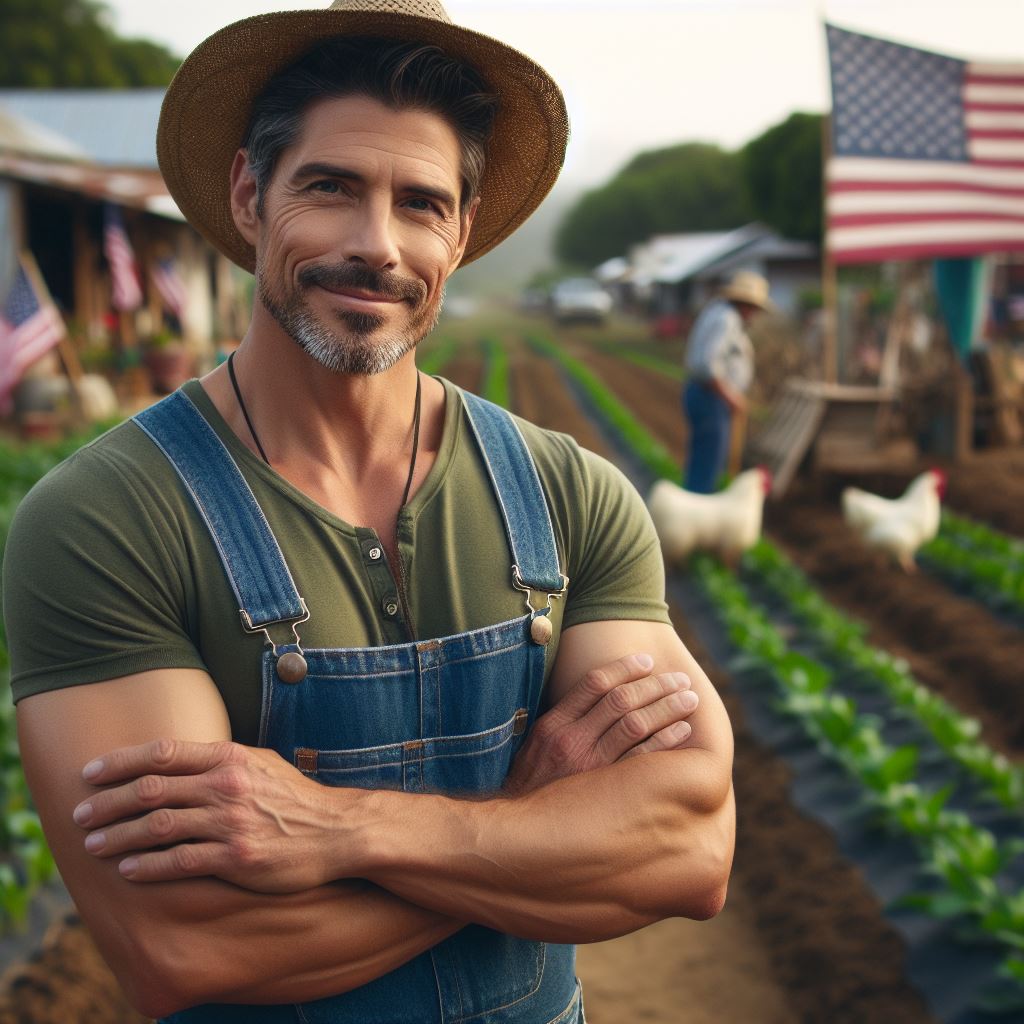Introduction
Transitioning from a military career to a life on the farm is an endeavor filled with challenges and opportunities.
For veterans, agriculture offers a unique path towards a meaningful and rewarding second act.
In this blog post, we will explore the journey of veterans who have become farmers and highlight the importance of their contribution to the agricultural industry.
Upon leaving the military, veterans often face the daunting task of finding a new purpose and direction in civilian life.
Transitioning to farming allows them to continue serving their communities, utilizing their skills in a different setting. However, this transition comes with its own set of challenges.
From acquiring the necessary skills and knowledge to navigating the agricultural industry, veterans must overcome various hurdles to succeed.
In this blog post, we will delve into the specific challenges faced by veterans during their transition to farming.
We will discuss the obstacles they encounter, such as lack of experience in the field, limited access to resources and training, and financial constraints.
Moreover, we will explore the support systems and programs available to veterans seeking careers in agriculture.
By shedding light on the stories of veterans turned farmers, we hope to inspire and inform others considering a similar path.
Through their determination and resilience, veterans are not only finding personal fulfillment but also addressing the growing need for sustainable food production.
Join us in this exploration of the journey from veteran to farmer and discover the profound impact veterans are making in the world of agriculture.
The Journey of a Veteran Farmer
The story of a specific veteran who successfully transitioned into farming
- Alexander, a former soldier, transformed his life by embracing a new career as a farmer.
- After years of military service, he found solace in the tranquility and fulfillment that farming brings.
- His story is an inspiration to many veterans seeking a meaningful and sustainable life after service.
The motivations and reasons behind this veteran’s decision to become a farmer
- Alexander’s deep connection to nature and his desire to contribute to food security were the driving forces.
- He wanted to continue serving his country by producing healthy, organic food for his community.
- The opportunity to work closely with the land and nurture life resonated with his core values.
Challenges faced during the transition period and how they were overcome
- Transitioning from a structured military environment to the unpredictability of farming posed initial challenges.
- Learning agricultural practices and building a network in the farming community required dedication and perseverance.
- Through attending workshops, seeking mentorship, and embracing trial and error, Alexander overcame these hurdles.
- Financial constraints were also a hurdle, but Alexander utilized veteran agricultural grants and loans to establish his farm.
The role of passion, determination, and hard work in the journey
- A deep passion for farming, combined with determination, fueled Alexander’s journey.
- He worked tirelessly, waking up early, tending to crops, and constantly honing his agricultural skills.
- His unwavering commitment to his vision sustained him through the ups and downs of farming.
- Success gradually manifested as he witnessed his first harvest and received positive feedback from the community.
Read: Midwest Family Eco Farming Journey: A Midwest Family’s Tale
Opportunities and Resources for Veteran Farmers
Overview of the support and resources available specifically for veterans interested in farming
- Government-backed initiatives and programs provide substantial support to veterans aspiring to become farmers.
- Various organizations and resources are dedicated to assisting veterans in navigating the unique challenges of entering the agricultural industry.
Government programs and initiatives providing funding, training, and mentorship opportunities
- The U.S. Department of Agriculture (USDA) offers multiple programs designed to support veteran farmers.
- The “Bridges to Opportunity” initiative provides funding for veterans to start or expand their farming operations.
- The USDA’s Farm Service Agency (FSA) offers low-interest loans to veterans for purchasing land or equipment.
- The Farmer Veteran Coalition (FVC) collaborates with the USDA to provide mentorship and entrepreneurship training for veterans.
- The FVC’s Homegrown by Heroes program enables veterans to label their agricultural products, giving them a marketing advantage.
Non-profit organizations and initiatives dedicated to assisting veterans in pursuing a career in agriculture
- The National Center for Veterans in Agriculture (NCVA) connects veterans with resources, education, and job placement opportunities.
- Heroes to Hives is a nonprofit program that provides disabled veterans with beekeeping training and equipment.
- The Farmer- Veteran Fellowship Fund offers grants to veterans, helping them establish their own farming enterprises.
- The Farmer-Veteran Coalition’s Farmer Veteran Fellowship Program provides direct assistance to veterans transitioning into agriculture.
- The Vets Café & Grill supports and trains veterans to become successful farmers and entrepreneurs.
Information on educational programs and workshops tailored for veterans interested in farming
- Cornell University’s Small Farms Program offers various courses and workshops specifically designed for veterans.
- Many state agricultural extensions provide outreach programs and workshops focused on assisting veterans in farming.
- The Veterans Sustainable Agriculture Training (VSAT) program includes hands-on training and mentorship for aspiring veteran farmers.
- The Rodale Institute offers a Veterans Organic Farming Training program to educate veterans on organic farming practices.
- The Texas A&M AgriLife Extension provides resources and training through their “Battleground to Breaking Ground” program.
In a nutshell, veterans interested in pursuing a career in farming have a range of opportunities and resources available to support them.
Government programs and initiatives, non-profit organizations, and educational programs offer funding, training, mentorship, and specialized workshops tailored to veterans.
By taking advantage of these resources, veterans can successfully transition into the agricultural industry and thrive as farmers.
Read: Grains of Grit: Women’s Resilience in Farming
Benefits and Advantages of Veteran Farmers
The unique skills and experiences veterans bring to the farming profession
Veterans possess a set of unique skills and experiences that make them excellent candidates for the farming profession.
The discipline, perseverance, and work ethic they developed during their military service transfer seamlessly to the demanding nature of farming.
Moreover, veterans are accustomed to working in high-stress environments and adapting to challenging situations, which are common occurrences in the agricultural industry.
This resilience and ability to overcome obstacles make them well-equipped to handle the uncertainties and difficulties that come with farming.
Military training and discipline benefit veterans in managing farming operations
Military training provides veterans with valuable skills that directly translate to managing farming operations efficiently.
For example, their ability to plan and execute complex missions translates to effective farm management and strategic decision-making.
Veterans are also accustomed to following strict protocols and standard operating procedures, which can be crucial in ensuring proper compliance with agricultural regulations.
Furthermore, their experience in logistical operations and supply chain management can be instrumental in running a smooth and well-organized farming operation.
Transform Your Agribusiness
Unlock your farm's potential with expert advice tailored to your needs. Get actionable steps that drive real results.
Get StartedVeteran farmers as assets to their communities – supporting local food systems and veterans’ organizations
Veteran farmers play a crucial role in supporting local food systems and strengthening their communities.
By producing fresh, nutritious, and locally grown food, they contribute to food security and reduce reliance on imported goods.
Veterans also frequently engage in community outreach programs, educational initiatives, and mentorship activities, sharing their knowledge and skills with others.
Additionally, veteran farmers often collaborate with veterans’ organizations, providing opportunities for fellow veterans to reintegrate into civilian life and find meaningful employment.
Their commitment to service extends beyond their military duty as they continue to serve their communities through farming.
Success stories and examples of veteran farmers who have made a positive impact
There are numerous inspiring success stories of veteran farmers who have made a significant positive impact on their communities.
For instance, some veterans have established successful organic farms, promoting sustainable agriculture and environmental conservation.
Others have started community-supported agriculture programs, directly connecting consumers with locally grown produce.
Furthermore, veteran farmers have been instrumental in revitalizing rural areas by converting abandoned lands into thriving agricultural businesses.
These success stories not only demonstrate the potential of veteran farmers but also inspire others to pursue a career in agriculture.
In general, veteran farmers bring a unique set of skills, experiences, and qualities that greatly benefit the agricultural industry and their communities.
Their military training and discipline make them effective managers, while their dedication to service extends to supporting local food systems and veterans’ organizations.
By highlighting success stories, we can inspire more veterans to pursue farming as a fulfilling and impactful post-military career.
Read: New Age Farmers: Young Women in Agriculture

You Might Also Like: Digital Age Farming: Millennials on the Field
Challenges and Overcoming Obstacles
Common Challenges and Obstacles Faced by Veteran Farmers
- Lack of experience in agriculture and farming techniques.
- Difficulty accessing resources and support networks.
- Limited knowledge of market demands and consumer preferences.
- Inadequate infrastructure and equipment.
- Uncertainty regarding financial viability and profitability.
- Adapting to the physical demands and rigors of farming.
Financial Barriers and Accessing Capital
One significant challenge for veteran farmers is securing the necessary funds to cover land, equipment, and startup costs.
Transitioning from military service to farming often requires substantial capital investment.
To overcome this obstacle:
- Veterans can explore government assistance programs specifically designed for aspiring farmers.
- They can seek out grants, loans, and scholarships available exclusively for veterans in agriculture.
- Partnering with local organizations and nonprofits can offer access to financial resources and assistance with navigating the application process.
- Engaging with agricultural lenders who understand the unique challenges faced by veterans in the farming industry can also be helpful.
Overcoming Limited Knowledge of Farming Practices and Techniques
Veterans may lack the necessary expertise in farming practices and techniques, which can impede their success in the industry.
However, there are several ways to overcome this obstacle:
- Participating in hands-on training programs specifically designed for transitioning veterans looking to enter agriculture.
- Enrolling in agricultural courses or degree programs to acquire a solid foundation in farming practices.
- Seeking mentorship opportunities from experienced farmers who can provide guidance and support.
- Collaborating with local agricultural extension services to access educational resources and workshops.
Addressing Mental Health and Wellness Concerns
Veterans, especially those dealing with post-traumatic stress disorder (PTSD), may face unique mental health challenges when transitioning to farming.
The isolation, pressure, and demanding nature of farming can further exacerbate mental health concerns. To address these issues:
- Seeking professional help from mental health providers who specialize in working with veterans and farmers can provide crucial support.
- Connecting with veteran support groups or agricultural organizations that prioritize mental health and wellness can offer a sense of community.
- Implementing stress management techniques, such as mindfulness exercises, regular physical activity, and time for self-care, can significantly contribute to overall well-being.
- Developing a strong support network of family, friends, and fellow farmers can provide a valuable system of emotional support.
In summary, veteran farmers face various challenges and obstacles while transitioning into agriculture.
However, with perseverance, access to resources, training, mentorship, and a focus on mental health and wellness, they can overcome these hurdles and build successful farming businesses.
Read: She Grows: The Rise of Female Farm Entrepreneurs
Conclusion
Transitioning veterans discover a newfound sense of purpose and fulfillment as they embark on the journey into farming.
Through their unique blend of skills acquired during their service, veterans bring resilience, discipline, and a strong work ethic to the agricultural landscape.
Their ability to adapt to challenging situations and problem-solve effectively equips them for the diverse demands of farming life.
To veterans considering a transition into farming, take heart and embrace this opportunity.
Your experiences have prepared you for the challenges and rewards of agriculture.
With determination and a willingness to learn, you can find success and fulfillment in cultivating the land and nourishing your community.
It’s essential for readers to support and advocate for veteran farmers in their communities.
By providing access to resources, training programs, and mentorship opportunities, we can help veterans thrive in agriculture.
Let’s ensure they have the support they need to make a smooth transition and build sustainable livelihoods as farmers.
Showcase Your Farming Business
Publish your professional farming services profile on our blog for a one-time fee of $200 and reach a dedicated audience of farmers and agribusiness owners.
Publish Your ProfileVeteran farmers bring immense value to the industry through their expertise, dedication, and resilience.
As they continue to make valuable contributions to agriculture, it’s crucial to recognize their potential and empower them to succeed.
By investing in veteran farmers, we not only honor their service but also strengthen the agricultural sector for generations to come.




